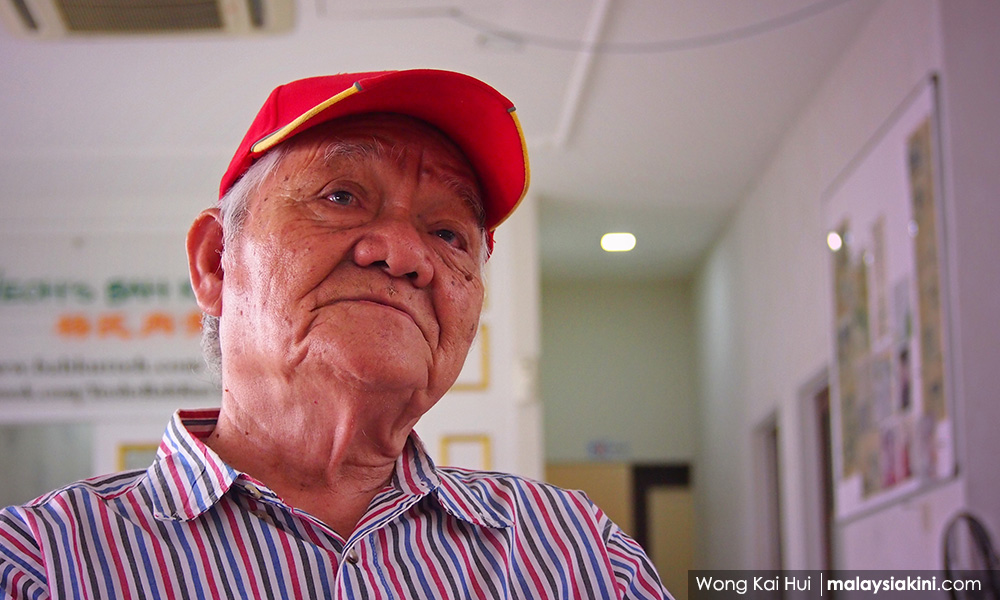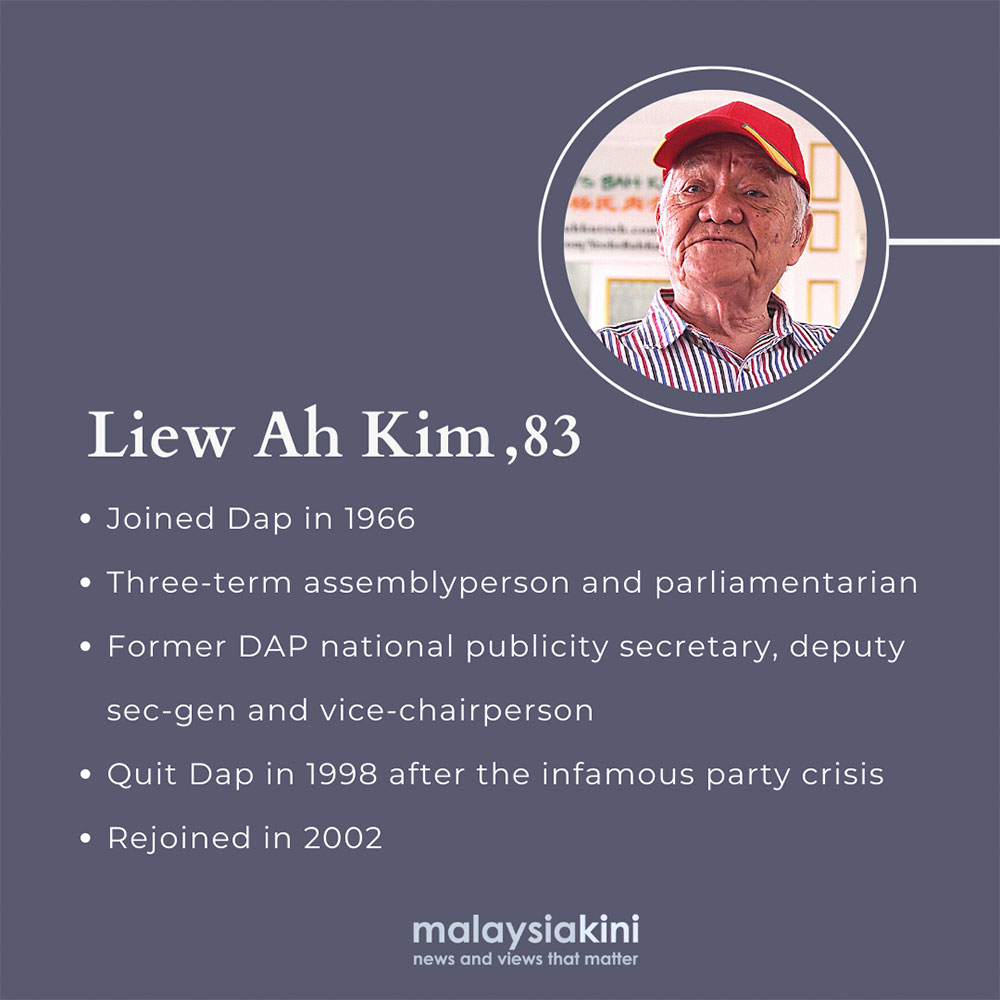INTERVIEW | Since the 13th general election, DAP has been attempting to make inroads with the Malay electorate and to shed its Chinese-dominated party image.
This led to a clash within the party dubbed as the “Blue Ocean vs Red Ocean” debate.
During the debate, labels such as “Hua Sha” (Chinese chauvinist) and “Da Ai” (great love) were hurled at the opposing factions. The latter term is a sarcastic reference for the faction which believes it is crucial for the party's future to win the hearts and minds of Malay voters.
In an interview with Malaysiakini, DAP veteran Liew Ah Kim weighed in on whether there is a “Chinese chauvinist” faction.
It appears that the answer, according to him, is both “yes” and “no”.
The 83-year-old former lawmaker, who is making a comeback after a 20-year hiatus, said that there also exists an “English chauvinist” label in DAP.
He explained that the term “chauvinist” is merely used for the convenience of reference and this does not mean there are those who blindly believe that their race, culture or identity are superior to others.
Liew himself was dubbed as the “grandmaster of the Hua Sha faction” by former party member Hew Kuan Yau, who remains an influential figure of the faction despite quitting the party almost four years ago.
Labels started in the 70s
The octogenarian said the labels in DAP can be traced back to a party crisis in the late 1970s.
At the Pengkalan Kota state by-election in 1980, DAP nominated English-educated candidate Teoh Teik Huat against the will of then Penang DAP state leader Tan Yu Su, who wanted to field Chinese-educated Goh Lim Earn.
Teoh lost to an MCA candidate and this ignited the blame game.
Lim Kit Siang, who was secretary-general of the DAP at the time, was accused of suppressing Chinese-educated members.
The crisis ended with the sacking of four leaders who criticised the party decision - Tan Yu Su, Goh Lim Earn, Seow Han Cheng and Tan Teik Chuan.
However, the ripple effect of the crisis led to the emergence of factions which labelled each other as either "Chinese chauvinist" or "English chauvinist".
Liew, who joined DAP in 1966, believed that the factions arose due to differences in family and educational backgrounds, which led to those in the respective camps to focus on different issues.
"For example, the 'English chauvinist' faction talks about the judiciary, which is a more theoretical and academic thing.
“We, on the other hand, talk about racial equality, provisions in the constitution and how to protect the basic rights of minorities," he said.

Liew argued that the so-called “Chinese chauvinist” faction should not be perceived as conservative.
“We are also concerned about environmental issues as well as the development of science and technology.
"We are not frogs at the bottom of the well. We are labelled as Chinese chauvinists just because we are Chinese educated,” he added.
Liew, who majored in the Chinese language at Singapore's Nanyang University and has written several novels and poems, said he worked hard to learn English as well.
Stressing that he respects all cultures, the former DAP vice-chairperson said he does not see himself as a “Chinese chauvinist”.
"I read Confucius and Mencius, but I also read the Bible," he said, adding that he speaks English with his friends in the church.
"It is really hard to believe that someone who speaks English in the church is called a 'Chinese chauvinist'," he said.
New crop of DAP leaders
Acknowledging that the factionalism does not bode well for DAP, Liew, however, said Kit Siang has been able to serve as a conduit between the two sides.
On the same note, he believes that such factions do not exist among the new crop of DAP leaders.
"There is no such thing as 'Chinese chauvinist' in the new generation now. Who is a 'Chinese chauvinist'? Can you tell me?" he added.
Liew was elected as an MP and assemblyperson for three terms. He faded from politics after the DAP leadership crisis in the late-1990s.

The factions were also mentioned in the preface of his recently published memoir, which was penned by his protege Hew.
Hew pointed out that DAP members came from different backgrounds. The English-educated group can be further divided into liberals and social democrats, while the Chinese-educated members are mostly social democrats.
"The English-educated leaders are more persistent in defending civil liberties in a constitutional democracy while their Chinese-educated counterparts tend to pursue racial equality and strive for the dignity of minorities," he wrote.
The "English chauvinist" leaders, he explained, are mostly Chinese professionals or elites, who tend to "think in English", have a higher social and economic status and are relatively alienated from the grassroots and Chinese community.
Although the "Chinese chauvinist” faction has extensive support among the grassroots and community, Hew said DAP's previous central leadership was dominated by the “English chauvinist” fraction.
Red Ocean vs Blue Ocean
The differences also led to separate electoral strategies, known as the "Red Ocean vs Blue Ocean".
As the growth of Chinese support is reaching its limit, the “Blue Ocean” strategy was proposed to explore the “wider and greater market” - Malay votes.
This narrative can be traced back to the outcome of the 2013 general election. Despite DAP winning most of the Chinese-majority constituencies, Pakatan Rakyat failed to capture Putrajaya.
However, some felt that DAP should not abandon its principles and core values in its attempt to attract more Malay votes.
For example, it should continue to defend secular principles, safeguard Chinese education and racial equality - the so-called “Red Ocean" strategy.
In 2014, DAP fielded Dyana Sofya Mohd Daud in the Teluk Intan by-election.
However, Dyana Sofya's defeat made it difficult to argue that a Malay candidate could break the stereotype that DAP is a "Chinese party" and this led to the debate regarding the two strategies.

Quizzed on his position, Liew said DAP should adhere to its principles and consolidate the existing Chinese base. He lamented that DAP had deviated from its past struggle and this has disappointed the Chinese community.
"I have heard some people say DAP wants to give up the Chinese vote and explore the 'Blue Ocean' to get 30 percent (Malay) support. The question is can you do it?
"Do you think the Chinese community will always support you? You are betraying the community if you fail to keep your promises. Will they support you the next time?
"MCA is an example. The Chinese community used to support MCA because they gave people hope. It was some kind of sustenance.
"If DAP can no longer become their sustenance and hope, why should they support you? When you lose 50 percent of Chinese votes, how do you survive?” Liew asked. - Mkini



No comments:
Post a Comment
Note: Only a member of this blog may post a comment.